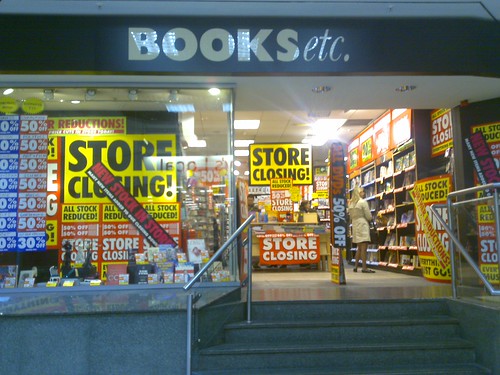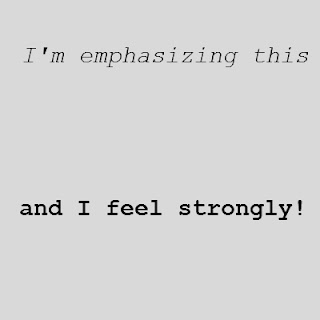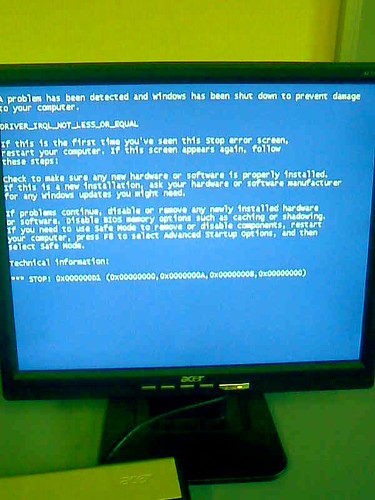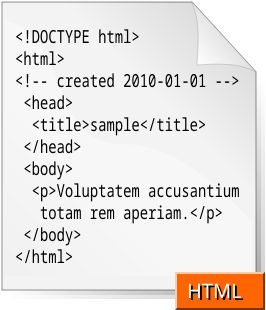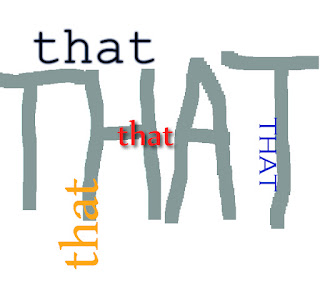This is my one hundredth post, so instead of doing a new Writing 101 lesson I'm going to re-do all of them...after a fashion. And since I've done so many Writing 101 posts in the past few months, there are a lot of them -- so we haven't got any time to waste.
(Almost) Every Step of Writing eBooks
Once inspiration hits and you've got a great idea, get to work and create an outline. Start thinking about your main character, and all the other characters in the book, as you plan out the plot. Give your characters plausible-sounding names.
Research your plot and your setting to fill your book with realistic, coherent details.
Format your manuscript properly, and save yourself some trouble. Always set the justification, and make sure you know what you're doing if you start adding page numbers, headers and footers.
As you write, be particular about how you format your chapter breaks and scene breaks. Don't ever, ever use the tab button...unless you want to dance with the Devil.
Be careful about the words you choose. Avoid the further/farther problem and the effect/affect war while you're working. Don't over-use words like that and very; don't ever use words like alot and forever.
Use care when writing potentially offensive and adult subject matter into your story, and be careful about how you use italics, bold and other in-text formatting.
Make use of online writing tools if you need help figuring out ages, naming characters or choosing a setting -- among other particulars. If you get writer's block, try some simple exercises to get around it.
Use vivid, descriptive writing to draw readers deeply into the story you're telling.
Don't forget about backing up your work while you're writing, and if the worst does happen attempt a bold rescue operation to save your book.
Write great dialogue to draw readers in, but make sure you're using proper quotation punctuation when you're doing it.
If you're going to use colons, ellipsis and semicolons in your book, make sure you're doing it the right way.
Speaking of punctuation, brush up on your comma usage. Lots of indies seem to have trouble with it. Learn how to use parentheses properly while you're at it.
Don't indiscriminately use brand names or celebrity names in your book. You have to do it safely to avoid legal issues and other problems you definitely don't want.
Be mindful of your tense and your point-of-view while you're writing the book; readers hate inconsistencies in these areas.
Pay attention to your length as you work on your manuscript, and when all is said and done give it a thorough editing to perfect the text.
If you're going to use a pen name, choose one that's spectacular. Once you've got one, it's time to make a book cover, or find someone who can, to complete your book.
Before you even think about publishing the book anywhere, be absolutely certain that you own the copyright.
Convert your book into an ebook to make it viewable on an ereader. Use ebook codes to make everything look perfect, and add all the little extras, like images, to make it pop.
Choose the right genre for your book, and appeal directly to your target audience.
Be competitive when pricing your books; don't make it harder on yourself than it already is. Create a sensational blurb for your book that will help it sell itself.
Find out how to get reviews, and drum up some attention for your book. Try not to get too upset by bad reviews; it's an opportunity to improve.
Once you get some reviews, pull a few good review quotes out of there for marketing purposes. Try promoting your work with a blog tour, and create a book trailer to get even more marketing power.
Put your book in print to appeal to a wider audience of readers.
And once you're done with all of that, come back here for new tips -- because I'll have another Writing 101 post to introduce tomorrow.
(Almost) Every Step of Writing eBooks
Once inspiration hits and you've got a great idea, get to work and create an outline. Start thinking about your main character, and all the other characters in the book, as you plan out the plot. Give your characters plausible-sounding names.
Research your plot and your setting to fill your book with realistic, coherent details.
Format your manuscript properly, and save yourself some trouble. Always set the justification, and make sure you know what you're doing if you start adding page numbers, headers and footers.
As you write, be particular about how you format your chapter breaks and scene breaks. Don't ever, ever use the tab button...unless you want to dance with the Devil.
Be careful about the words you choose. Avoid the further/farther problem and the effect/affect war while you're working. Don't over-use words like that and very; don't ever use words like alot and forever.
Use care when writing potentially offensive and adult subject matter into your story, and be careful about how you use italics, bold and other in-text formatting.
Make use of online writing tools if you need help figuring out ages, naming characters or choosing a setting -- among other particulars. If you get writer's block, try some simple exercises to get around it.
Use vivid, descriptive writing to draw readers deeply into the story you're telling.
Don't forget about backing up your work while you're writing, and if the worst does happen attempt a bold rescue operation to save your book.
Write great dialogue to draw readers in, but make sure you're using proper quotation punctuation when you're doing it.
If you're going to use colons, ellipsis and semicolons in your book, make sure you're doing it the right way.
Speaking of punctuation, brush up on your comma usage. Lots of indies seem to have trouble with it. Learn how to use parentheses properly while you're at it.
Don't indiscriminately use brand names or celebrity names in your book. You have to do it safely to avoid legal issues and other problems you definitely don't want.
Be mindful of your tense and your point-of-view while you're writing the book; readers hate inconsistencies in these areas.
Pay attention to your length as you work on your manuscript, and when all is said and done give it a thorough editing to perfect the text.
If you're going to use a pen name, choose one that's spectacular. Once you've got one, it's time to make a book cover, or find someone who can, to complete your book.
Before you even think about publishing the book anywhere, be absolutely certain that you own the copyright.
Convert your book into an ebook to make it viewable on an ereader. Use ebook codes to make everything look perfect, and add all the little extras, like images, to make it pop.
Choose the right genre for your book, and appeal directly to your target audience.
Be competitive when pricing your books; don't make it harder on yourself than it already is. Create a sensational blurb for your book that will help it sell itself.
Find out how to get reviews, and drum up some attention for your book. Try not to get too upset by bad reviews; it's an opportunity to improve.
Once you get some reviews, pull a few good review quotes out of there for marketing purposes. Try promoting your work with a blog tour, and create a book trailer to get even more marketing power.
Put your book in print to appeal to a wider audience of readers.
And once you're done with all of that, come back here for new tips -- because I'll have another Writing 101 post to introduce tomorrow.














